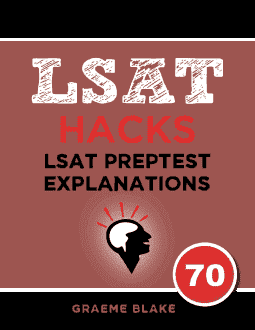DISCUSSION: As with all questions of this type, you can prove the answer 100% correct by finding references in both passages.
If you’re reading this explanation, there’s good odds that you chose answer D. But only passage A mentions a paradox. Watch out for this on comparative passages. Passage A does not determine what’s true in passage B.
You might have hesitated about E because passage A doesn’t directly mention data. But passage A cites a study. Everyone would agree that a scientific study is data. That’s an example of a warranted term shift.
___________
- The first sentence of the second paragraph shows that the author of passage B disagrees with biological origins. Passage A never mentions biology.
- Neither author does this. I have no idea what this answer refers to – neither passage mentions what popular opinion thinks of the theories discussed. If you picked this, you have some self-examination to do. Ask yourself what gave you the impression this was correct – you’ll avoid many errors if you figure out why you chose this. Note: the first sentence of the second paragraph shows that the theory is commonly heard, but that could just mean several researchers mention it, but not the general public.
- Same as B. This is completely unsupported. Examine your thought process to see why you found this tempting.
- Very tempting. The first lines shows that the author of passage A believes that the data represent a paradox. But the author of passage B never mentions a paradox. They seem to think that the situation is perfectly clear: we’re motivated by success and value, end of story.This answer is hard because the early mention of ‘paradox’ sets the tone for both passages. Remember not to carry ideas from passage A into passage B.
- CORRECT. The author of passage A cites a study (the fourth paragraph). That’s data.
The author of passage B mentions data directly: see the second sentence of the second paragraph.


Hi Graeme! I find answer C “accept a claim for the sake of argument” very tempting. I understand it as ” both passsages hold a claim which are supported by logical arguments. I think I might misuderstand the answer choice. Could you clarify what answer choice C actually means?
Accepting something “for the sake of argument” doesn’t mean that it’s supported by logical arguments. It’s the equivalent of “imagine if” and doesn’t necessarily have to be true. So for example, I can say “Let’s suppose, for argument’s sake, Shrek is the president…” but this doesn’t mean Shrek is the president.